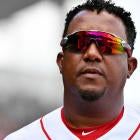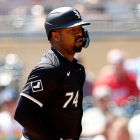Over the weekend, former Boston Red Sox ace Pedro Martinez became the latest big name to opine on the Houston Astros' sign-stealing scandal as part of an interview with WEEI. Rather than focus on the Astros' wrongdoing, or their reluctance to own up to their sins, Martinez set his sights on Oakland Athletics pitcher Mike Fiers, the closest thing the scandal has to a whistleblower. It was Fiers, after all, who went on the record and discussed what the Astros were doing with Evan Drellich and Ken Rosenthal of The Athletic back in November.
Martinez called Fiers a "bad teammate" and said that he "broke the rules" by publicizing clubhouse matters. Martinez then rolled through a checklist of steps he would have liked to have seen Fiers run through before talking to the press: "If you have integrity you find ways to tell everybody in the clubhouse, 'Hey, we might get in trouble for this. I don't want to be part of this,'" he said, per a WEEI transcript. Here's more from Martinez, who works as an analyst with TBS and MLB Network and also has a role in the Boston front office as a special assistant to the president of baseball operations:
"You call your GM. You tell him. Or you call anybody you can or MLB or someone and say, 'I don't want to be part of this.' Or you tell the team, 'Get me out of here, I don't want to be part of this.' Then you show me something. But if you leave Houston and most likely you didn't agree with Houston when you left and then you go and drop the entire team under the bus I don't trust you. I won't trust you because I did have that rule."
We've already argued why Fiers should be commended rather than criticized for his acts. We touched on some of these talking points, but, for posterity's sake, let's address them again.
Saying that Fiers should have talked to his teammates, his manager, or his front office sounds like a salient observation. Except Martinez, and others who trot out that talking point, ignore the realities of the situation. The same belief system that animates Martinez and his kind to bash Fiers for being a bad teammate and violating the sacred rule of the clubhouse also enables this kind of behavior in the first place by creating an unhealthy culture that frowns upon dissent.
A.J. Hinch, who was ostensibly well-liked and respected in the clubhouse, couldn't muster a greater objection than breaking two monitors. Hinch was operating from a position of power, as the manager, and yet he couldn't find it in him to push back in a meaningful way. Asking Fiers, or any other individual player on the roster, to step forward and enact change is a stretch.
Say Fiers had approached general manager Jeff Luhnow, or owner Jim Crane. He probably would still be getting criticized for going outside of the clubhouse -- and to what ends? Luhnow and Crane may not have been aware of the sign-stealing operation, but both benefited directly from its execution. Besides, Crane never seemed too bothered by Luhnow's front office and its history of pushing moral and ethical bounds. Perhaps that's an unfair characterization; perhaps Crane vetoed Luhnow more than the public knows. In that case, you would have to ask why Crane trusted Luhnow's judgement for as long as he did -- until it became inconvenient. (That's to say nothing of Martinez proposing that Fiers request a trade; as if that request would have been granted, or would have been viewed positively by anyone in or outside of Houston.)
Maybe Fiers could have convinced commissioner Rob Manfred to launch an investigation without first stirring public pressure. Who knows. It would be nice if people, including quality analysts like Martinez, would start demanding as much from their institutions as they do from their whistleblowers. If they did, there wouldn't be as much need for whistleblowers to exist.






















